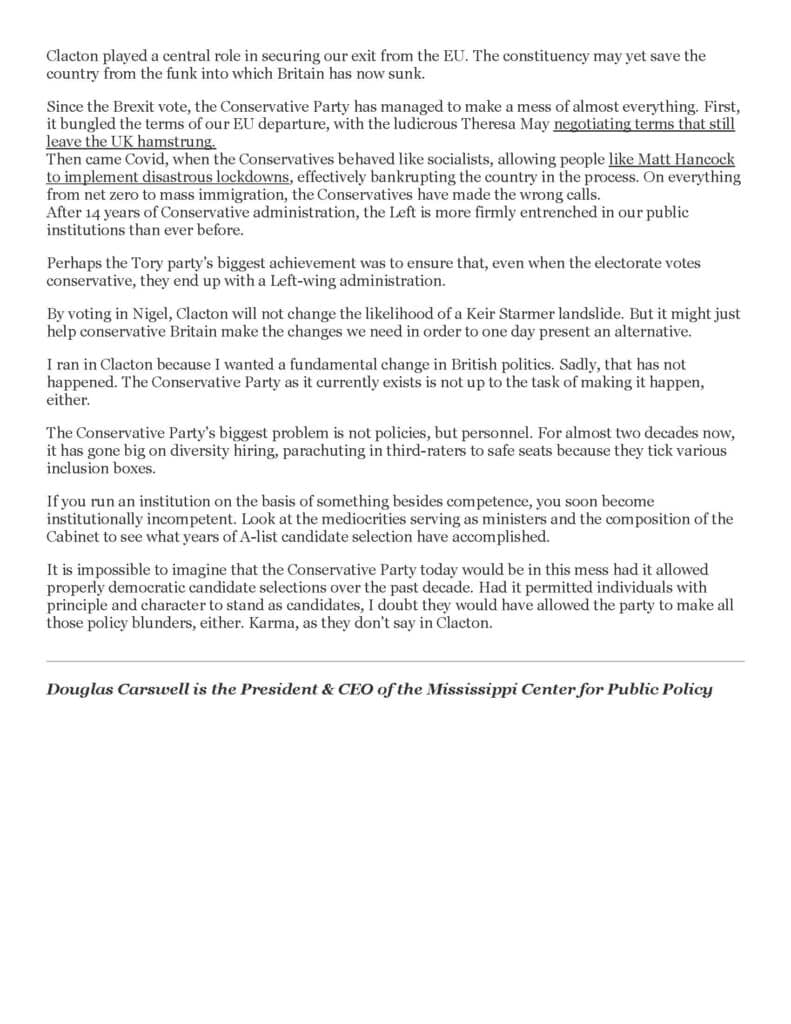Before I came to Mississippi, I was a Member of the British Parliament for 12 years for Clacton. Donald Trump's friend, Nigel Farage, has now decided to run for election in Clacton on July 4th.
I'm delighted and I encouraged Nigel to run the moment it was announced that there would be a General Election. (I know, the Brits do politics differently with flexible, rather than fixed, terms)
Back in the old country, the Conservative party faces annihilation.
Having sat in office since 2010, Britain’s Conservatives have failed to govern on conservative principles. Today, their supporters are abandoning them for Nigel Farage’s new Reform party.
Perhaps this should serve as a stark warning for those who campaign as conservatives, but who govern as progressives.
Here in Mississippi, Republicans have been in charge since 2011, about as long as Britain’s Conservatives.
Where are the big strategic changes our state needs? What reforms are being advanced to elevate Mississippi?
There are, I would suggest, three top challenges Mississippi faces:
- The state of education: Sure, there might have been some marginal improvements in standards thanks to the use of phonics. Overall education standards remain poor. Two out of three 4th graders in government schools fail to achieve proficiency in reading or math. Almost one in four Mississippi students are chronically absent from school.
- Low labor participation: At a time when millions of migrants are moving to America to work, often illegally, nothing of substance has been done in our state to address the fact that 48 percent of Mississippi adults of working age are not even active in the labor market.
- DEI in state institutions: Despite having conservatives elected, many of Mississippi’s public institutions, including universities, are run by those beholden to Marxist academic ideology.
Imagine if we were to use the notionally conservative majority in our state to accomplish actual conservative reforms to tackle any of this?
Here is a list of some of the bills that were blocked in the most recent legislative session:
- Ballot initiative, passed by the House, blocked by the Senate.
- Anti DEI legislation, blocked.
- School choice. Allow families to choose schools between different districts. Blocked.
- Healthcare reform. Repeal intentionally restrictive laws that limit the provision of healthcare. Blocked.
The one big achievement of the session, Rep. Rob Roberson’s INSPIRE bill which personalizes school funding for students, passed because of Speaker White’s drive and determination. Eight weeks ago there were still some in the Senate intent on preserving the old Soviet-era funding formula.
Morton Blackwell, a great American hero who I happened to meet for tea in Jackson, once said that “In politics, nothing moves unless it’s pushed.”
He’s right. If we want to see conservative policies implemented in our state, we are going to have to do a lot of pushing!
Nobody likes to be pushed, particularly politicians. Leaders will not thank you for making them do something they would preferred not to have done, as my experience with Brexit taught me.
Here at the Mississippi Center for Public Policy we are 100 percent in the business of pushing for the kind of bold, principled conservative reforms we need.
We need to start using our conservative majority to deliver the kind of changes we are starting to see in Republican-run states throughout the South.


You can tell a lot about someone’s politics given what they might have to say about the conviction of Donald Trump.
Anyone telling you that Trump’s conviction is comeuppance for a sordid hush-money scandal, in which he broke the law, probably leans left.
Someone explaining that it was all a disgraceful attempt by Joe Biden’s Democrats to stop the 45th President from being re-elected, is likely to be a conservative.
In an increasingly post-religious society, politics has become a substitute belief system for many. The danger is that we view everything through the prism of politics.
Rather than ask what Trump’s conviction means for your side in the Reds versus Blues battle, perhaps what we ought to reflect on what this might all mean for America.
For most of human history, the law meant whatever the powerful said it meant. Anyone who has ever tried to do business in Russia or China knows that’s still the way things are in much of the non-Western world.
A system in which the law is elevated above the executive – in which the rule of law has supremacy – is historically unusual. Indeed, it is largely the creation of people who spoke and wrote in the language in which you are reading this.
It was English-speaking civilization that invented the notion that the powerful are constrained by rules, and that the rules should apply to everyone equally. A straight line runs from Magna Carta at Runnymede to the Founders at Philadelphia. The US Bill of
Rights of 1789 was preceded by an English Bill of Rights of 1689.
America has become the most successful society on earth precisely because in this Republic, government doesn’t get to change the rules as it likes.
“Exactly!” the anti-Trumpers will say. “Trump’s conviction is true to that tradition! Even former Presidents are subject to the same rules as everyone else”.
But is that really so? In what way has Trump been subjected to the same set of rules? Surely, those on the right will say, he has been singled out, prosecuted over something essentially trivial?
Those that brought the charges, it seems to me, were motivated by politics, rather than justice.
Prosecuting political rivals is what they do in Russia, Brazil or Malaysia. It is awful to see political prosecutions in the United States – and it bodes ill for the future of freedom in this country and around the world.
Twenty years ago, George Bush’s electoral strategist, Karl Rove, hit upon the idea of using ‘wedge-issues’ to galvanize the conservative base. At the time, Rove seemed to be remarkably successful. Republicans won.
Two decades on, I wonder if it was partly Rove’s ‘wedge-issue’ approach that provoked the left into doing something similar. Under Obama, the left became increasingly inflammatory. Perhaps there is a straight line that runs from the politics of ‘wedge-issues’ in the noughties to the culture wars we see today?
Some on the left might be tempted to celebrate the use of lawfare to try to take down a political opponent. They might want to stop and think first. It is, I worry, only a question of time before we start to see something similar from the right.
If lawfare becomes part of American politics, what chance is there that the United States remains exceptional compare with all those other less happy republics?
It is not just the legal process that America needs to de-politicize. We need to stop making everything a question of where you stand in the culture war. Your views on Disney or money management, Taylor Swift or Chick-Fil-A should not automatically correlate with the way you vote.
If it is politics alone that gives you a belief system in life, you are going to end up desperately disappointed with both politics and life.
The United States was founded by people that believed that to survive, a Republic needs a moral citizenry. America needs to believe in something above politics and beyond the next election cycle.
A school choice revolution is sweeping America. Mississippi is now sandwiched on either side by states that give families control over their child’s share of state education dollars.
In Arkansas and Alabama, the state government will pay between $7,000 - $9,000 into a dedicated Education Savings Account for each individual child. Mom & dad will then be able to allocate that money to a school that best meets the needs of their child.
Almost of dozen states have done something similar, but not Mississippi. Why?
Despite having a solid Republican majority for over a decade, Mississippi has made ridiculously little progress towards school choice.
Right now our state has a total of nine Charter Schools, less than 0.8 percent of the total, and fewer than one might find in a single suburb of New Orleans. Our school choice program for Special Needs students has hardly grown at all.
According to one of the leading figures of the school choice movement, Corey DeAngelis, whose new book “The Parent Revolution” has just been released, COVID lockdowns were the great catalyst for change in other states.
Before COVID, many parents meekly assumed that education meant sending their kids to whichever government school people in their zip code were assigned. Along came the lockdowns, and millions of Americans got to see how many government schools are run in the interests of teacher unions and school board bureaucrats, rather than their kids.
Teacher Unions were quick to call for schools to be closed, and fought to keep things that way. They attacked suggestions schools reopen as “rooted in sexism, racism and misogyny”. The vice president of the Chicago Teacher Union attacked proposals to return to in-person teaching - while on vacation in Puerto Rico!
So why didn’t COVID lockdowns help shake things up in our state? Lots of government schools in Mississippi were closed for extended periods. How come that not led to more pressure for school choice in the Magnolia state?
The biggest barrier to change in our state is that fact that not enough of our elected politicians see the need for change. Many prefer to believe that standards in government schools are better than they are, and if things aren’t bad, they reason, why change?
Advocates for school choice need to be prepared to present some uncomfortable facts about education standards in our state:
- 2 in 3 fourth graders in Mississippi government schools fail to achieve proficiency in reading. According to National Assessment of Educational Progress data only 31 percent of fourth graders were at or above reading proficiency in 2022.
- Almost 4 in 10 fourth graders in 2022 did not even reach the basic reading standard.
- 2 in 3 fourth graders in Mississippi government schools fail to achieve proficiency in math, with only 32 percent at or above proficiency in 2022.
- At eighth grade, 8 in 10 were failing to achieve math proficiency in 2022.
- Almost one in four Mississippi students – 108,000 children – are chronically absent from school. Mississippi Department of Education data shows that in 2022-23 the chronic absentee rate from Mississippi government schools was 23.8 percent.
- The chronic absentee rate is way above the national average and has skyrocketed from 70,275 in 2016 – 17 to 108,310 in 2022-23.
If you want to young Mississippians to get a better start in life than this, you need to support fully fledged school choice.
School choice advocacy organizations, like MCPP, have often made the case for change in terms of social justice. School choice, we like to say, would give every American child opportunities that today only rich families have. This isn’t enough.
Nor is it enough to keep publishing white papers nobody reads and drafting legislation that never gets passed.
We need to demonstrate that school choice is the only effective response to the ‘woke’ takeover of government-run classrooms by the ideological left.
Many government schools in America have clearly been promoting Critical Race Theory, an off shoot of Marxist academic theory. Often this has been done innocuously, under the banner of promoting equity, diversity or inclusion.
Sometimes the mask slips. We know, for example, that here in Republican-run Mississippi, our own Department of Education has recommended that teachers use social studies resources calling for the abolition of Christopher Columbus Day and the payment of racial reparations.
There are no shortage of vested interests - teacher unions, education bureaucrats, federal officials - determined to do everything they can to keep your kids captive in government-run classrooms.
To overcome that opposition, we must first address the anti-school choice politicians who indulge them.
In Texas, Gov. Greg Abbot was a fully-throated champion of universal education savings accounts. He threw his weight behind change, only to have a dozen or so “conservative” members of the legislature scupper the plan.
When Texas voters saw those anti-school choice “Republicans” vote to deny them school choice, they helped make these “Republican” lawmakers ex-lawmakers. School choice, I suspect, will sail through the Texas legislature in the next session.
Either you are a conservative and support school choice, or you aren’t.
MCPP President and CEO, Douglas Carswell, had the opportunity to speak at the Winona Rotary Club this past Friday.

Detailing MCPP's post-session plans, Douglas discussed our initiatives to combat DEI in our state universities, uncover the disincentives that welfare poses against full-time employment, and the newly passed Mississippi Student Funding Formula.
House Speaker, Jason White, addressed a packed lunch time meeting hosted by the Mississippi Center for Public Policy in Jackson.
Speaker White talked about what had been accomplished during his first session as House Speaker, and shared his priorities for the future.
Notably, under Speaker White’s leadership the House:
- Authored and achieved historic school funding reform so that Mississippi will now fund students, not a system.
- Voted to restore the ballot initiative process.
- Voted to overhaul Certificate of Need laws that intentionally restrict the number of healthcare providers.
- Voted for the SAFER Act to protect women’s spaces.
The Senate might have subsequently blocked the restoration of the ballot initiative and Certificate of Need reform, but both school funding reform and the SAFER Act have since passed into law.
“There was enormous interest in what Speaker White had to say” said Douglas Carswell, MCPP CEO. “Rather than skating over subjects, the Speaker went into tremendous detail.”
“While praising public schools, Speaker White talked about the need to allow money to follow the student within the public school system.”
“He also talked about Certificate of Need laws and the need to review the impact of such laws of restricting access to health care in certain areas.”
“MCPP loves hosting conservatives, and there was real warmth towards Speaker White and what he had to say.”
Many university degrees produce a negative return on investment, according to a report out this week. Data from the Foundation for Research on Equal Opportunity shows that the cost of many college degrees is not offset by increases in lifetime earnings.
This prompted me to take a look at some separate Mississippi-specific data from the State Workforce Investment Board on graduate earnings. I discovered an extraordinary variance in the future earning potential of different degrees.
Here are the earning averages for fifteen different degree types for Mississippi public universities:

So what? Demand for engineers and insurance professionals is far greater than for actors and anthropologists. Some degrees require more rigor than others.
But then I took a look at data on what happens to Mississippi high schoolers. Approximately 6 in 10 of those that do complete public high school in Mississippi fail to either start any form of college education, or start but fail to complete any kind of college education.
Of those public high school graduates that do go into any kind of post-secondary education, about 1 in 3 drop out.
Pointing out awkward facts about education in Mississippi can be a sensitive subject. Much has been said about the relative improvements in Mississippi’s reading and writing scores in recent years. To be fair, our state is no longer 49th out of 50, but 30-something-or-other.
Great, but the data also shows that only 31 percent of 4th graders were at or above proficiency in reading in 2022. In other words, more than two in three Mississippi 4th graders were not proficient in reading.
The data also shows that a mere 32 percent of 4th graders were at or above math proficiency in 2022. Forgive me if I don’t rush to celebrate a system that fails to produce proficiency for two thirds of public school 4th graders.
In the worst school districts, a student has the odds of achieving proficiency overwhelmingly stacked against them. But even in the best performing school districts – the ones they keep telling us are good – nearly 4 in 10 students are not proficient.
These are the hard facts about public education in our state, and facts do not care about politicians’ feelings. Neither should you if you want to improve the life chances of young people in our state.
Poor proficiency rates in primary education help explain why one in three public high school graduates are dropping out of college education later on.
The underperformance of our education system helps explain the low rate of workforce participation in our state. Unless we acknowledge the underperformance of our education system and address it, we will see our state held back.
If our private school system was producing these kind of outcomes, I suspect politicians would have acted yesterday. Instead, the inconvenient facts are brushed under the carpet.
If we are to change Mississippi for the better, this has to change. Policy makers must not keep going along to get along. That is a recipe for yet more mediocrity.
The time for taking false comfort in marginal improvements is over. The implementation of phonics reading in primary schools might indeed have raised reading standards, but on its own, it is not the strategic change in education we need.
If we want an education system that prepares young people for the life they might live, we need action to ensure:
- Higher standards in the classroom – which means more parent power.
- Ensure more of our high school graduates complete a useful education after high school.
- Allow students to take degrees with better returns on investment, both for the individual student and the state as a whole.
Douglas Carswell is the President and CEO of the Mississippi Center for Public Policy
This has been a good week for education reform in Mississippi. Our lawmakers might not agree on much, but last Saturday, they finally voted to replace the old education funding formula with the new Mississippi Student Funding Formula.
Under the old funding formula, your tax dollars were spent in the interests of the education bureaucrats. Local administrators were guaranteed the same amount of revenue even when they lost students or underperformed.
Mississippi will now fund students, not a system. Every student will now get a base amount of $6,695, on top of which they will then receive additional amounts based on their own individual circumstances.
This is a major win for Speaker Jason White and Chairman of the House Education Committee, Rob Roberson, as well as for Jansen Owen and Kent McCarty. The bill would not have passed without a strong lead from the Governor, Tate Reeves, as well.
Now that Mississippi will personalize the amount of funding each student gets, the money might just start to follow the student.
Will this happen? Thanks to a ruling by the Mississippi Supreme Court on Thursday, one of the key objections against it happening has been removed.
Lawmakers opposed to school choice in our state often suggest that while they personally might agree with school choice, sadly, you can’t put government money into private schools.
Thursday’s Supreme Court ruling shows this excuse to be bunkum.
During Covid, when large sums of federal money were provided to Mississippi, our state legislature, in turn, authorized a state agency to distribute some of those funds to private schools for infrastructure improvement.
This prompted an activist group, Parents for Public Schools, to challenge allocating public money to private schools as unconstitutional. Had Parents for Public Schools been successful, we might have found ourselves in a situation now where public dollars could not follow a student into the private sector.
Thursday’s ruling is a defeat not just for anti-school choice activists. It means that those in the legislature looking for a ready-made excuse not to support school choice can no longer hide behind the claim that school choice is unconstitutional.
As our legal division, the Mississippi Justice Institute argued when we filed a ‘friend of the court’ brief, alongside the Institute for Justice, the Mississippi Constitution does not prevent school choice.
You might have noticed that despite there being a supposedly conservative majority in our state legislature, not a great deal of conservative legislation was passed this session.
A bill to tackle DEI (Diversity, Equity & Inclusion) dogma in our public universities was killed in committee. Efforts to restore the Right of Initiative fizzled out, as did proposals to remove restrictive laws that intentionally limit the number of health care providers.
Our lawmakers weren’t even prepared to pass a law that might have allowed Mississippians to buy wine online. They only just managed to pass the SAFER Act to protect women’s rights at the eleventh hour.
The forces of do-nothing intransigence are powerful. But as the success of education funding reform shows, inertia can be overcome.
When Speaker White played hardball and Governor Reeves gave a clear lead, the intransigent folded. Maybe this is the way to achieve change?
Mississippi desperately needs change. Reformers need to be prepared to ruffle a few feathers in order to achieve it.
Douglas Carswell is the President & CEO of the Mississippi Center for Public Policy.
Imagine if all the restaurants in your neighborhood were guaranteed the same revenue even if they managed to serve fewer customers?
That’s pretty much how Mississippi has been funding public education for the past thirty years, under the so-called Mississippi Adequate Education Funding Formula Program, or MAEP system.
Under MAEP, taxpayer dollars are allocated in a way that suited education administrators and local bureaucrats. Under the so-called ‘hold harmless’ provisions of the MAEP, they did not need to worry about loss of revenue, even if they lost students and underperformed.
Last week, the Mississippi legislature finally voted to replace the antiquated MAEP system, with the new Mississippi Student Funding Formula. HB 4130 passed unanimously in the House, and before sailing through the Senate on a 49-3 vote.
Under the new Student Funding Formula, Mississippi will fund actual students, not a self-serving system. What does this mean in practice?
Every student will now be allocated a base amount of $6,695. On top of that base amount, a weighted system will be used to allocate additional funds to each student depending on their individual circumstances.
MAEP treated every child as if they were an identical accounting unit on a bureaucratic spreadsheet. As every parent knows, each child is different and has different needs. The new Student Funding Formula recognizes this fact. Children with special needs, or particularly gifted students, get more, as do those from lower income neighborhoods.
The new formula has a specific weighting for career and technical education, too, which could be important for future workforce development.
Also important is the fact that those crony ‘hold harmless’ deals, which reward mediocrity, will be terminated in 2027.
Early on in this session, Speaker Jason White made it clear that he was 100 percent committed to getting this new funding formula passed. Both he, and the Chairman of the House Education Committee, Rob Roberson, who authored the bill, deserve enormous credit for getting it though the legislature. Kudos, too, to Jansen Owen and Kent McCarty.
Frankly, this bill would not have passed without a strong lead from the Governor, Tate Reeves, as well. He made it clear that he was 100 percent behind this reform, and repeatedly talked about the need to fund students, not a system.
HB 4130 is really important for the future of education reform. Perhaps, though, there is an even greater significance in its passage through the legislature.
What happened last week shows that Mississippi has leaders that are willing to spend political capital achieving the kind of change our state needs. Do-nothing intransigence is not so powerful after all.
When reformers in our state work together, they win.
